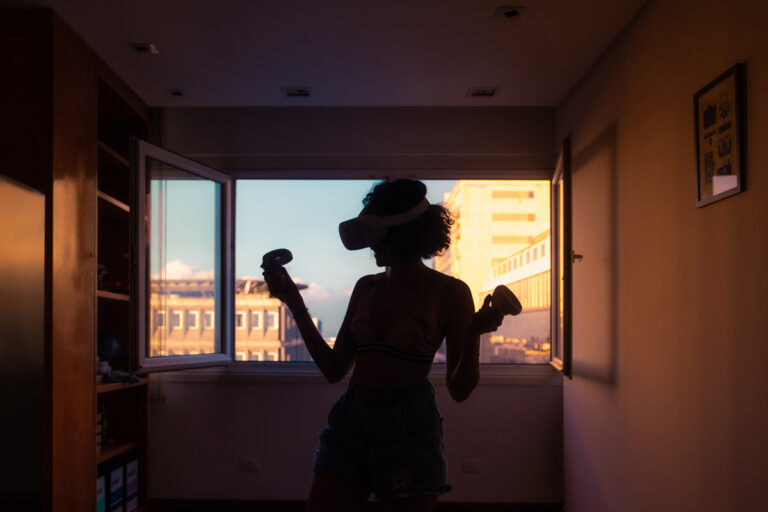Fighting trauma with trauma: how VR exposure therapy can be used to treat PTSD

An April 2021 survey by the Centers for Disease Control and Prevention (CDC) cited significant increases in respondents showing symptoms of anxiety disorders. Healthcare workers have reported high rates of post-traumatic stress disorder (PTSD) during the pandemic—a February study of 1,000 frontline workers reported that nearly one-quarter showed likely signs of the disorder. In contrast, only 6.8 per cent of the general population ever experiences PTSD in their lifetime, according to National Institute of Mental Health estimates. Long story short, mental health conditions are on the rise due to the COVID-19 pandemic, among many other factors.
The toxic stress of lockdown and the constant uncertainty of the past year created conditions for widespread anxiety, which, for many, have just been added on top of already existing reasons. As virtual reality technology improved over the years and headsets became more affordable, academics started seeing its potential in helping to treat PTSD. Can VR exposure therapy really treat people dealing with trauma by making them relive it?
Although recreational VR headset sales to the general public have grown during the pandemic, the technology has yet to fully enter the medical mainstream. Experts who study VR therapy argue that’s about to change as clinicians look for effective and accessible ways to treat anxiety disorders.
Many VR therapies build on a somewhat divisive therapeutic technique called ‘prolonged exposure’, developed by Edna B. Foa, a professor of psychiatry at the University of Pennsylvania Perelman School of Medicine. Prolonged exposure is a cognitive intervention therapy—patients first describe a traumatic event to a therapist, in great detail and in the present tense, and then confront triggers of the traumatic event in the real world.
“While some experts have worried the practice might overwhelm or re-traumatise patients, prolonged exposure is now widely accepted as an effective tool to treat chronic PTSD,” writes The New York Times. With ‘practice’, patients become desensitised to their memories and end up proving to themselves that their thoughts can be safe. If you overcome something in VR, you basically overcome it in real life too.
For now, direct-to-consumer virtual reality therapy products remain rare, and only a few are covered by insurance in the US. Looking into whether the technology truly works and what patients who’ve tested it have to say, The New York Times spoke to US veteran Chris Merkle who, after years spent struggling with the invasive symptoms of PTSD, decided to give VR exposure therapy a try.
Understandably, building up the courage in order to agree to try a virtual reality simulation that would mimic his days in combat took Merkle some time. “I was like, you want to put me in a virtual world, reliving my worst days, my worst nightmares?” he told The New York Times. Months later, after his symptoms intensified and he felt desperate for a solution, he finally agreed.
At a Department of Veterans Affairs hospital in Long Beach, California, Merkle strapped into a headset and sank into the past. The details in the simulation were extremely precise, he said: the military-issue truck, the weight of the model gun in his hand, the dark swath of sand in the night. He narrated one particularly troubling incident out loud to a clinician, who adjusted the simulation as he spoke. “I was seeing that person shooting at me, that I hadn’t thought about in 10-plus years,” Merkle said. He was terrified. But when he took the goggles off, he said, the sense of accomplishment became its own form of comfort. Confronting the past in VR proved to him that he could survive revisiting his memories.
After about seven runs through the simulation, Merkle started uncovering fragments of memory his mind had blacked out, which is a common response to trauma. The treatment was working—he was less scared of his memories, and therefore less scared of himself. “He was getting better,” writes The New York Times.
Although VR exposure therapy should not be seen as a miracle solution, for some patients, it offers convenience and can immerse them in scenes that would be hard to replicate in real life. While a significant amount of funding on virtual reality’s therapeutic potential has focused on military veterans, researchers are ready to start treating civilian trauma.
During the pandemic, Johns Hopkins researchers have used the technology to reduce stress and burnout in medical workers. In one unpublished study, 50 nurses from a COVID-19 ward tested virtual reality mindfulness exercises (guided meditations beside animated fields and waterfalls) and all but one participant reported reduced stress levels.
In the UK, the NHS announced in March 2020 that it will offer a new virtual reality treatment for patients with social anxiety. Meanwhile, researchers are also testing whether they can alleviate childhood social anxiety with virtual reality programmes, one of which uses animated AI bullies that growl things like “give me your lunch money.” Virtual reality also looks promising for treating phobias. As more people grapple with the pandemic’s aftermath, it certainly looks like VR therapy might be needed for civilians ASAP.




